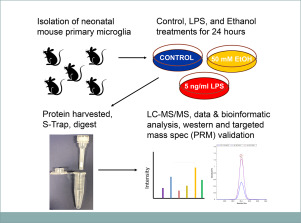当前位置:
X-MOL 学术
›
J. Proteomics
›
论文详情
Our official English website, www.x-mol.net, welcomes your
feedback! (Note: you will need to create a separate account there.)
Deep proteome profiling reveals novel pathways associated with pro-inflammatory and alcohol-induced microglial activation phenotypes.
Journal of Proteomics ( IF 2.8 ) Pub Date : 2020-03-18 , DOI: 10.1016/j.jprot.2020.103753 Jennifer Guergues 1 , Jessica Wohlfahrt 1 , Ping Zhang 2 , Bin Liu 2 , Stanley M Stevens 1
Journal of Proteomics ( IF 2.8 ) Pub Date : 2020-03-18 , DOI: 10.1016/j.jprot.2020.103753 Jennifer Guergues 1 , Jessica Wohlfahrt 1 , Ping Zhang 2 , Bin Liu 2 , Stanley M Stevens 1
Affiliation

|
Microglia, the resident immune cells of the brain, can exhibit a broad range of activation phenotypes, many of which have been implicated in several diseases and disorders of the central nervous system including those related to alcohol abuse. Given the complexity of global-scale molecular changes that define microglial activation, accurate phenotypic classification in the context of alcohol exposure is still lacking. We employed an optimized method for deep, quantitative proteome profiling of primary microglia in order to characterize their response to acute exposure to alcohol (ethanol) as well as the pro-inflammatory driver and TLR4 agonist, LPS. From this analysis, 5,062 total proteins were identified where 4,857 and 4,928 of those proteins were quantifiable by label-free quantitation in ethanol and LPS treatment groups, respectively. This study highlights the subtle, yet significant proteomic changes that occur in ethanol-treated microglia, which do not align with the robust pro-inflammatory phenotype induced by TLR4 activation. Specifically, our results indicate inhibition of several upstream regulators associated with inflammation, opposing effects on pathways such as phagocytosis upon comparison to TLR4-mediated pro-inflammatory phenotype, and a potential metabolic shift associated with increased expression of proteins related to OXPHOS and lipid homeostasis. Data are available via ProteomeXchange with identifier PXD14466. SIGNIFICANCE: Alcohol abuse has a significant impact on the central nervous system, which includes the pathophysiological mechanisms resulting from glial cell activation. Microglia, in particular, are the resident immune cells of the brain and exhibit a broad range of activation phenotypes. The molecular changes that drive microglial activation phenotype are complex and have yet to be fully characterized in the context of alcohol exposure. Our study highlights the first and most comprehensive characterization of alcohol-induced proteomic changes in primary microglia to date and has shed light on novel immune-related and metabolic pathways that are altered due to alcohol exposure. The results from this study provide an important foundation for future work aimed to understand the complexity of alcohol-induced microglial activation in vivo and other translational models of acute and chronic alcohol exposure.
中文翻译:

深入的蛋白质组分析揭示了与促炎和酒精诱导的小胶质细胞活化表型相关的新途径。
小胶质细胞是大脑的固有免疫细胞,可以表现出广泛的激活表型,其中许多表型与中枢神经系统的几种疾病和病症有关,包括与滥用酒精有关的疾病和病症。考虑到定义小胶质细胞活化的全球分子变化的复杂性,在酒精暴露的情况下仍然缺乏准确的表型分类。我们采用了一种优化的方法对初级小胶质细胞进行深度,定量的蛋白质组分析,以表征其对急性暴露于酒精(乙醇)以及促炎性驱动程序和TLR4激动剂LPS的反应。从该分析中,鉴定出了5,062种总蛋白,其中分别通过乙醇和LPS处理组的无标记定量可定量这些蛋白中的4,857和4,928。这项研究强调了在乙醇处理的小胶质细胞中发生的细微但重要的蛋白质组学变化,这与TLR4激活诱导的强大的促炎表型不符。具体而言,我们的结果表明与炎症相关的几个上游调节因子受到抑制,与TLR4介导的促炎症表型相比,对吞噬作用等途径的相反影响以及与OXPHOS和脂质体内平衡相关蛋白表达增加相关的潜在代谢转移。数据可通过ProteomeXchange获得,其标识符为PXD14466。重要性:酗酒会对中枢神经系统产生重大影响,其中包括由神经胶质细胞活化引起的病理生理机制。小胶质细胞,尤其是 是大脑的固有免疫细胞,并表现出广泛的激活表型。驱动小胶质细胞活化表型的分子变化是复杂的,并且在酒精暴露的情况下尚未得到充分表征。我们的研究突出了迄今为止由酒精引起的初级小胶质细胞蛋白质组学变化的第一个也是最全面的表征,并阐明了由于暴露于酒精而改变的新型免疫相关和代谢途径。这项研究的结果为今后的工作提供了重要基础,这些工作旨在了解体内酒精诱导的小胶质细胞激活以及急性和慢性酒精暴露的其他转化模型的复杂性。驱动小胶质细胞活化表型的分子变化是复杂的,并且在酒精暴露的情况下尚未得到充分表征。我们的研究突出了迄今为止由酒精引起的初级小胶质细胞蛋白质组学变化的第一个也是最全面的表征,并阐明了由于暴露于酒精而改变的新型免疫相关和代谢途径。这项研究的结果为今后的工作提供了重要基础,这些工作旨在了解体内酒精诱导的小胶质细胞激活以及急性和慢性酒精暴露的其他转化模型的复杂性。驱动小胶质细胞活化表型的分子变化是复杂的,并且在酒精暴露的情况下尚未得到充分表征。我们的研究强调了迄今为止酒精引起的初级小胶质细胞蛋白质组学变化的第一个也是最全面的表征,并阐明了由于酒精暴露而改变的新型免疫相关和代谢途径。这项研究的结果为今后的工作提供了重要基础,这些工作旨在了解体内酒精诱导的小胶质细胞激活以及急性和慢性酒精暴露的其他转化模型的复杂性。我们的研究突出了迄今为止由酒精引起的初级小胶质细胞蛋白质组学变化的第一个也是最全面的表征,并阐明了由于暴露于酒精而改变的新型免疫相关和代谢途径。这项研究的结果为今后的工作提供了重要基础,这些工作旨在了解体内酒精诱导的小胶质细胞活化的复杂性以及急性和慢性酒精暴露的其他转化模型。我们的研究突出了迄今为止由酒精引起的初级小胶质细胞蛋白质组学变化的第一个也是最全面的表征,并阐明了由于暴露于酒精而改变的新型免疫相关和代谢途径。这项研究的结果为今后的工作提供了重要基础,这些工作旨在了解体内酒精诱导的小胶质细胞活化的复杂性以及急性和慢性酒精暴露的其他转化模型。
更新日期:2020-03-19
中文翻译:

深入的蛋白质组分析揭示了与促炎和酒精诱导的小胶质细胞活化表型相关的新途径。
小胶质细胞是大脑的固有免疫细胞,可以表现出广泛的激活表型,其中许多表型与中枢神经系统的几种疾病和病症有关,包括与滥用酒精有关的疾病和病症。考虑到定义小胶质细胞活化的全球分子变化的复杂性,在酒精暴露的情况下仍然缺乏准确的表型分类。我们采用了一种优化的方法对初级小胶质细胞进行深度,定量的蛋白质组分析,以表征其对急性暴露于酒精(乙醇)以及促炎性驱动程序和TLR4激动剂LPS的反应。从该分析中,鉴定出了5,062种总蛋白,其中分别通过乙醇和LPS处理组的无标记定量可定量这些蛋白中的4,857和4,928。这项研究强调了在乙醇处理的小胶质细胞中发生的细微但重要的蛋白质组学变化,这与TLR4激活诱导的强大的促炎表型不符。具体而言,我们的结果表明与炎症相关的几个上游调节因子受到抑制,与TLR4介导的促炎症表型相比,对吞噬作用等途径的相反影响以及与OXPHOS和脂质体内平衡相关蛋白表达增加相关的潜在代谢转移。数据可通过ProteomeXchange获得,其标识符为PXD14466。重要性:酗酒会对中枢神经系统产生重大影响,其中包括由神经胶质细胞活化引起的病理生理机制。小胶质细胞,尤其是 是大脑的固有免疫细胞,并表现出广泛的激活表型。驱动小胶质细胞活化表型的分子变化是复杂的,并且在酒精暴露的情况下尚未得到充分表征。我们的研究突出了迄今为止由酒精引起的初级小胶质细胞蛋白质组学变化的第一个也是最全面的表征,并阐明了由于暴露于酒精而改变的新型免疫相关和代谢途径。这项研究的结果为今后的工作提供了重要基础,这些工作旨在了解体内酒精诱导的小胶质细胞激活以及急性和慢性酒精暴露的其他转化模型的复杂性。驱动小胶质细胞活化表型的分子变化是复杂的,并且在酒精暴露的情况下尚未得到充分表征。我们的研究突出了迄今为止由酒精引起的初级小胶质细胞蛋白质组学变化的第一个也是最全面的表征,并阐明了由于暴露于酒精而改变的新型免疫相关和代谢途径。这项研究的结果为今后的工作提供了重要基础,这些工作旨在了解体内酒精诱导的小胶质细胞激活以及急性和慢性酒精暴露的其他转化模型的复杂性。驱动小胶质细胞活化表型的分子变化是复杂的,并且在酒精暴露的情况下尚未得到充分表征。我们的研究强调了迄今为止酒精引起的初级小胶质细胞蛋白质组学变化的第一个也是最全面的表征,并阐明了由于酒精暴露而改变的新型免疫相关和代谢途径。这项研究的结果为今后的工作提供了重要基础,这些工作旨在了解体内酒精诱导的小胶质细胞激活以及急性和慢性酒精暴露的其他转化模型的复杂性。我们的研究突出了迄今为止由酒精引起的初级小胶质细胞蛋白质组学变化的第一个也是最全面的表征,并阐明了由于暴露于酒精而改变的新型免疫相关和代谢途径。这项研究的结果为今后的工作提供了重要基础,这些工作旨在了解体内酒精诱导的小胶质细胞活化的复杂性以及急性和慢性酒精暴露的其他转化模型。我们的研究突出了迄今为止由酒精引起的初级小胶质细胞蛋白质组学变化的第一个也是最全面的表征,并阐明了由于暴露于酒精而改变的新型免疫相关和代谢途径。这项研究的结果为今后的工作提供了重要基础,这些工作旨在了解体内酒精诱导的小胶质细胞活化的复杂性以及急性和慢性酒精暴露的其他转化模型。










































 京公网安备 11010802027423号
京公网安备 11010802027423号